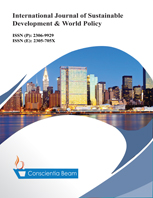How do economic growth, financial sector development and environmental regulation impact FDI inflows in the MENA countries?
DOI:
https://doi.org/10.18488/26.v12i1.3363Abstract
This paper asks lots of questions about the hit of economic growth, environmental regulation and financial sector development on FDI inflows, using both the static and dynamic panel data approaches for a panel of 17 MENA countries for the 1990-2015 period. Our results pointed out that a higher level of growth attracts FDI inflows. They also point out that laxer environmental regulation decreases FDI inflows. On the other hand, our findings proved that FDI inflows in react positively to the financial development sector. This implies that foreign direct investment aims to invest in a country that has a higher developed financial sector to facilitate the transaction with their original country. However, more policy implications are concluded of our study can be presented as follows. First, based on the impacts of economic growth and financial development on the FDI inflows for the MENA countries, policymakers showed develop economic and financial policies concerning the FDI inflows. This suggests that policy makers in these countries consider that more prudent policies might involve eliminating barriers that prevent local firms from establishing adequate linkages, improving local firms' access to inputs, technology, and financing, and streamlining the procedures associated with selling input. Second, policymakers in the MENA region implement more environmental regulation policies in order to control carbon emissions and prevent FDI capital flights.

